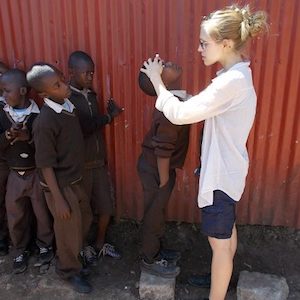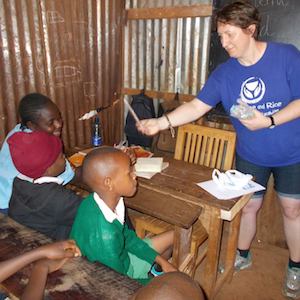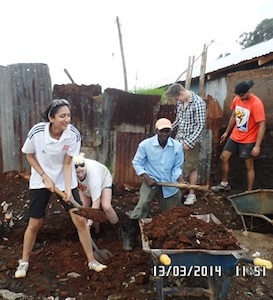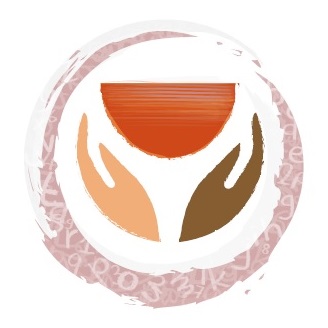On "Voluntourism"



Porridge and Rice is opposed to voluntourism in all its forms. Voluntourism is sometimes referred to as poverty tourism.
Why does Porridge and Rice encourage volunteers?
Volunteers enable Porridge and Rice to achieve its goals by giving their time, enthusiasm and skills free of charge. Work done by volunteers includes improving the mathematical knowledge of teachers, equipping school staff with the skills needed to provide first aid to pupils, obtaining quotes for building work, and inspiring children, especially girls, to set realistic but ambitious goals for their lives.
After seeing first hand the challenges and needs of some of the poorest people in the world, volunteers become important ambassadors for action to address extreme poverty by talking to friends, family, and other people with influence like headteachers and MPs. The more people that are aware of extreme poverty, the more people there will be that demand action from organisations that can effect change such as governments and businesses.
Porridge and Rice does not only look for volunteers to travel to Kenya but also in the UK, in fact, the management team of the charity is made up entirely of volunteers who are not only unpaid but who also pay their own expenses. Work done by volunteers in the UK includes making products to sell, helping with fundraisers, and undertaking speaking engagements.
The contribution made by volunteers to the work of Porridge and Rice is huge, in fact, the charity would not have been able to get to where it is today without volunteers.
Why do you want to volunteer?
Porridge and Rice looks for volunteers who share its values and want to help fight extreme poverty in the Nairobi slums. With education being a successful tool in combatting poverty, projects that enable partner schools to deliver a sound education to pupils in the Nairobi slums are the focus of volunteer work.
In Kenya, work is not generated to occupy volunteers then redone by locals when volunteers walk away. All work done by volunteers is needed to enable the programmes of the charity, whether repairing blackboards or supervising children hand washing before meals.
The projects undertaken by volunteers include both skilled and unskilled work. The most important quality that a volunteer requires is enthusiasm and a willingness to work hard. The charity tries to match projects to the skills and aspirations of volunteers, however, looks for volunteers prepared to try their hand to whatever is required. If you are not willing to be flexible turning your hand to whatever is need, then volunteering with Porridge and Rice may not be for you.
While volunteering can be an enjoyable experience, it is primarily an opportunity to make a meaningful difference to people in need. When possible, volunteers are encouraged to see Kenya, and the charity often helps to organise activities like white water rafting and going on safari at affordable prices. Tourism provides 10% of the employed population with their jobs, so money spent in the sector helps Kenyans, however, tourist activities take second place to charity work in the slums. If having a holiday or sightseeing are your main priority, then volunteering with Porridge and Rice may not be for you.
Who provides the funding for volunteering?
Volunteers are entirely self-funded including flights, insurance, and accommodation. If further activities such as white water rafting and safari holidays are arranged by the charity, the costs are passed on without mark- up to volunteers. The charity can provide guidance on how to do fundraising and organisations willing to support volunteers, but it does not use any of its own funds to cover volunteer costs.
Volunteers are not paid. The charity works hard to raise money to spend on charity programmes and does not divert any of these funds to volunteer costs and expenses.
All volunteers travelling to Kenya are required to pay a registration fee of £200. Considerable work goes into organising and supporting volunteers, and the registration fee is in recognition of this. The full amount goes to the charity and is spent on charity programmes in Kenya.
Would you volunteer if you were not allowed to take a camera with you?
If you cannot answer yes to this question then volunteering with Porridge and Rice is not for you.
Photos are taken by Porridge and Rice staff to raise awareness of the work of the charity, as well as to keep donors and sponsors informed on how the charity spends the money they give. Photographs are taken with the knowledge and permission of the people featured in them.
Porridge and Rice does many things off-camera and always will. There are many private and sensitive moments which are simply nobody’s business but the people involved. In addition, some people do not wish to be photographed and Porridge and Rice respects each person’s right on whether to be photographed or identified.
Volunteers may take photos and videos in the slums provided the people being photographed are treated with respect and given the chance to refuse. If there is any doubt, volunteers should refrain from taking photos. Most importantly, if taking photographs is a priority for you, then volunteering with Porridge and Rice may be disappointing.
Does the charity decide what is best for Kenyans or are Kenyans engaged in determining their own future?
Porridge and Rice works in partnership with schools created and run by Kenyans. The charity is convinced that Kenyans have should run schools in their own country, and thus all leadership roles in Kenya are filled by Kenyans.
The UK management team works with the Kenyan leadership team to determine the needs of the schools and to implement programmes that enable schools to deliver a sound education. Volunteers provide expertise, information, time, man-power, ideas, encouragement, enthusiasm, and resources to empower Porridge and Rice partner schools.
Does the charity support local workers and businesses?
The charity buys from local businesses in the slums preferring small local suppliers to large national businesses even where the cost is a little more. For example, uji meal for breakfast porridge is bought from a local lady who has a stall in Kawangware market rather than the national supermarket chain Naivas, and school desks are made by carpenters living in Ngando, an area of the Nairobi slums.
Even when booking leisure activities for volunteers like safari and white-water rafting, the charity chooses small local companies owned and staffed by locals. The charity likes to support people in the slums that are making a sincere effort to earn a living especially given the high levels of unemployment in the neighbourhood.
The focus of the charity is its partner schools, however, Porridge and Rice is committed to support local people and the community where possible by ensuring that money raised helps both the schools and the local community.
Is it reasonable to ask volunteers to do the tasks that they do?
Porridge and Rice cannot afford to waste scarce resources by having volunteers do a bad job that has to be redone at some later date, if not immediately. Work done by volunteers must be done to a good standard first time.
There are numerous tasks that require only enthusiasm and care such as serving uji, assisting children with washing their hands before meals, reading with pupils, clearing stones to prepare land for planting, and answering questions about life in a volunteer’s country. These tasks are available to all volunteers.
There are tasks that require some guidance and limited training such as repairing and replacing blackboards. Making a new blackboard requires an understanding of the materials and the dimensions needed as well as how to apply different types of paint including primer and blackboard paint. With the right mind set, these skills can be learned by most people. The charity has taught several volunteers how to make and install new blackboards, as well as repair existing ones, all of which have done excellent work.
Where volunteers have specialist skills, the charity matches the skill set of the volunteer to the task. Past examples include IT professionals giving computer tutorials, maths students teaching maths classes for teachers, nurses measuring the height and weight of pupils to compare against WHO standards, trainee nurses teaching first aid, and qualified teachers providing classes for Kenyan teachers on professional skills.
In all cases, the charity monitors the work of volunteers providing guidance and support as needed to ensure that work is done well. In addition, there is always more than enough work for all levels of skill that volunteers can change task if they find that they are uncomfortable doing a particular task. The charity aims to complete tasks whether done by volunteers or local workmen to the highest standards possible.
